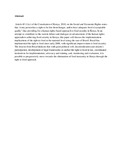| dc.description.abstract | Article 43 (1)(c) of the Constitution of Kenya, 2010, on the Social and Economic Rights states that ‘every person has a right to be free from hunger, and to have adequate food of acceptable quality’ thus providing for a human rights based approach to food security in Kenya. In an attempt to contribute to the current debate and dialogue on advancement of the human rights approach to achieving food security in Kenya, this paper will discuss the implementation implications of the right to food at the national level using the case of Brazil. Brazil has implemented the right to food since early 2000, with significant improvement to food security. The lessons from Brazil indicate that with good political will, decentralization and citizen’s participation, development of legal frameworks to anchor the right to food in law, coordinated institutions for implementation, advocacy and training, and, monitoring and evaluation, it is possible to progressively move towards the elimination of food insecurity in Kenya through the right to food approach | en |

